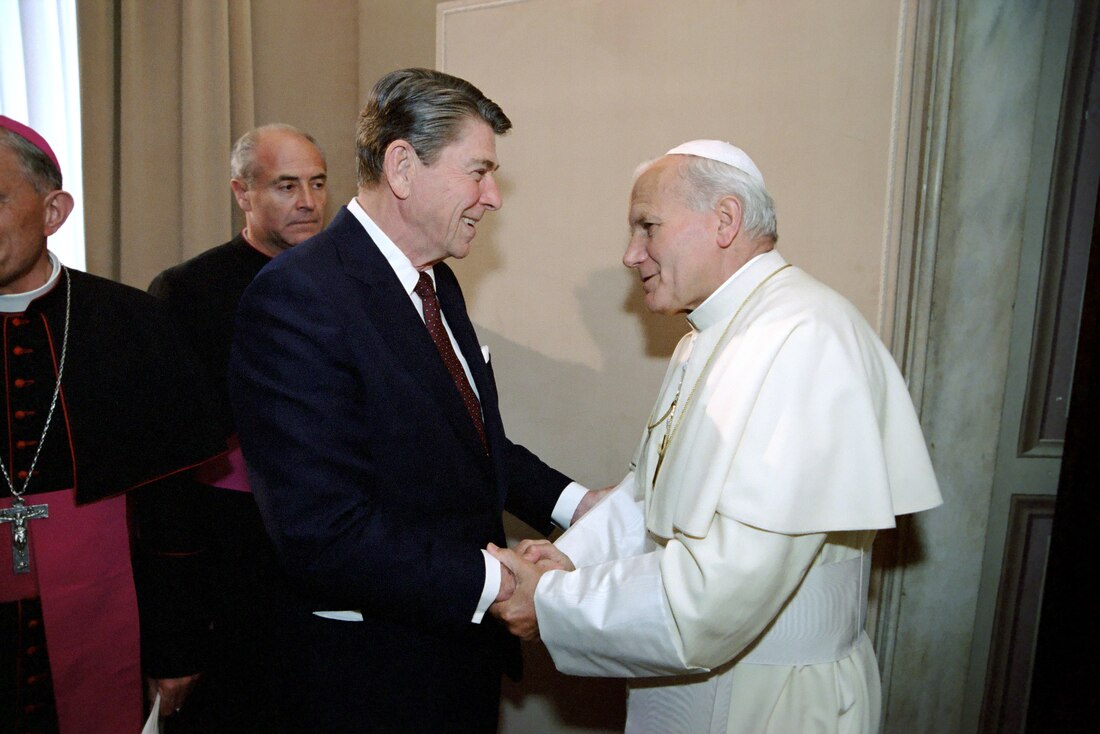|
My blog posts revolve around my interests and vocation as a historian: the intersection of history and contemporary church life, the intersection of history and contemporary politics, serendipitous discoveries in archives or on research trips, publications and research projects, upcoming conferences, and speaking engagements.
I sometimes blog for two other organizations, the Canadian Baptist Historical Society and the Centre for Post-Christendom Studies. The views expressed in these blogs represent the views of the authors, and not necessarily those of any organizations with which they are associated. |
|
https://commons.wikimedia.org/wiki/File:President_Ronald_Reagan_and_Pope_John_Paul_II.jpg Protestants often think they are the cutting edge of Christianity. And evangelicals often tout their proclivity to adaptation and innovation. Yet can other Christian traditions claim innovation as well? On 25 January 1959, Pope John XXIII announced to the church and the world that he intended to call an ecumenical church council with the purpose of uniting all Christian people. The reason seemed to be clear. As one historian notes: “How could an ancient Church that prided itself on being unchangeable and antimodern survive in a world undergoing social, political, and cultural transformations of unprecedented magnitude?”[1] Pope John XXIII wanted a council to answer such a question. And, as the church would find out not too many years later, Pope John Paul II was a huge factor in answering questions related to changes in the church. Especially as it related to politics.
My reading this week of an older article in First Things was a helpful reminder of some of those changes, specifically when Pope John Paul II was at the helm.[2] The article by George Weigel was so good I thought I would share some of the key points. Weigal is not Pollyanna about the papacy’s oft-dysfunctional relationship with political power. The point he is making is that John Paul II made an intentional decision to steer clear of seeking to impact change in the world through raw political power. Rather than using old-school political power moves, the papacy was to engage the world through moral persuasion. As Weigal writes, despite the necessary international networks and relationships of the Vatican, “the power of the papacy lies in a charism of moral persuasion capable of being translated into political effectiveness.” Vatican Two had charted a new course for the papacy, and, in many ways, John Paul II embodied the aspirations of its many Decrees, Constitutions, and Declarations. The length of his tenure (pope from 1978-2005) meant that he had ample time to effect change, and the unique ethos of his leadership rooted in humility, service, and compassion established an ideal for papal ministry. It was also, ironically, an effective way of bringing about change in the church and the world. Was he perfect? Of course not. Did he model a way forward for a church increasingly on the margins? Weigal thought he did. And I agree. Weigal provides an excellent summary of the paradox of John Paul II’s life and his public impact. He writes, “At the end of the century in which it was widely agreed that ‘power comes out of the barrel of a gun,’ the paradox in the public impact of John Paul II also reminds us of five other truths: [1] that the power of the human spirit can ignite world-historical change; [2] that tradition can be as potent a force for social transformation as a self-consciously radical rupture with the past; [3] that moral conviction can be an Archimedean lever for moving the world; [4] that ‘public life’ and ‘politics’ are not synonymous; [5] and that a genuinely humanistic politics always depends upon a more fundamental constellation of free associations and social institutions in which we learn the truth about ourselves as individuals and as members of communities.” John Paul II was faced with a host of seemingly intractable and vexing and ambiguous crises in and outside of the church. What made his leadership so successful (though not always) was his commitment to what some today often call a new way of doing politics. It is a call to abandon the Machiavellian cut and thrust of politics for something more Christian (and, ironically, more effective). It is not a call to forsake the halls of political power to avoid evil or compromise, but rather it is an infusing of Christian political engagement with compassion, humility, and a commitment to the truths of the gospel that fundamentally changes the rules of the game. Fundamentally it is a matter of moral persuasion. And those within the church universal – be it Catholic, Protestant, and Orthodox – would be wise to learn from a Pope who sought to provide a new way of politics in the Post-Christendom West. [1] Thomas Bokenkotter, A Concise History of the Catholic Church (2004 version), 396. [2] George Weigel, “Papacy and Power,” First Things (February 2001), 18-25.
0 Comments
Leave a Reply. |
Archives
May 2024
|

 RSS Feed
RSS Feed
